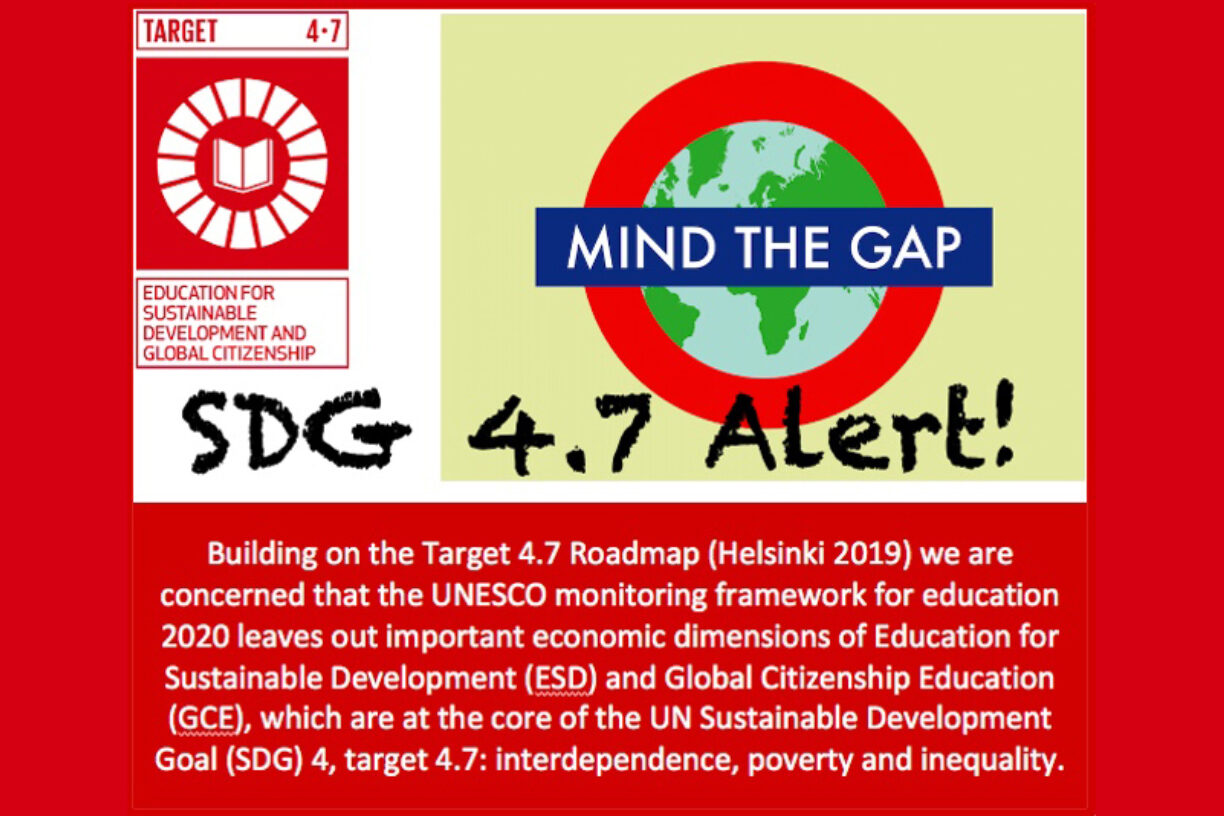Av Anne Cath da Silva
Publisert: 18. November 2020
This is an SDG 4.7 Alert issued by The Development Education Research Centre (DERC), the Academic Network on Global Education and Learning (ANGEL), The United Nations Association (UNA) of Norway, UNA-Finland, UNA-Iceland, UNA-Denmark, UNA-Sweden, The RORG-network Norway, MUNDU Denmark and The NUBU-network Norway
SDG 4.7 Alert: Mind the gap: Important dimensions of SDG target 4.7 are missing in UNESCOs monitoring framework for member states 2020
UNESCO has recently sent out a framework for monitoring member states´ implementation of the 1974 Recommendation concerning Education for International Understanding, Co-operation and Peace, and Education relating to Human Rights and Fundamental Freedoms, including the integration of Education for Sustainable Development (ESD) and Global Citizenship Education (GCE), in their Education systems (measuring SDG indicators 4.7.1, 12.8.1 and 13.3.1.).
Member states report on this every 4 years. The deadline for reporting in 2020 is the 31st of December.
We are several networks, consisting of researchers, NGOs/civil society organisations, practitioners and policymakers wanting to constructively engage with this monitory framework.
Building on the Target 4.7 Roadmap (Helsinki 2019), we are concerned that the framework leaves out important dimensions of both concepts, ESD and GCE, which is at the core of the UN Sustainable Development Goal (SDG) 4, target 4.7:
“By 2030 ensure all learners acquire knowledge and skills needed to promote sustainable development, including among others through education for sustainable development and sustainable lifestyles, human rights, gender equality, promotion of a culture of peace and non-violence, global citizenship, and appreciation of cultural diversity and of culture’s contribution to sustainable development”.
As far as we can see, the economic dimension of ESD tied to economic inequality and poverty and the core of GCE in regards to interdependence and mutual responsibility for global problems is missing in the monitory framework sent to member states.
It is confusing that social justice, defined as combating poverty and inequality, key elements of the SDGs, is not reflected in the reporting framework, despite being integrated in the overall UNESCO policy documents, such as in the “Framework for the implementation of the Education for Sustainable Development (ESD) beyond 2019” (p. 3):
«In 2015, the global community launched 17 Sustainable Development Goals (SDGs) addressing issues related to poverty, hunger, health, education, energy, work, industry, inequalities, cities, consumption, climate, ocean life, ecosystems, peace and partnership. Achieving these goals requires a profound transformation in the way we live, think and act; and the role of education in achieving all of the 17 SDGs is given heightened emphasis.”
Furthermore, the framework for monitoring appears not to reflect existing UNESCO understanding of ideas around complexity and interdependence, such as in the 2015-publication “Global citizenship education: topics and learning objectives” (p. 14):
“Global citizenship refers to a sense of belonging to a broader community and common humanity. It emphasises political, economic, social and cultural interdependency and interconnectedness between the local, the national and the global.”
Thus, we are concerned that UNESCOs way of defining core concepts may result in a narrow discourse, that does not reflect the current conceptual understanding within the fields of Education for Sustainable Development (ESD), Global Citizenship Education (GCE) and Global Education (GE) etc.
To rectify this, we call on UNESCO to bridge the gap and ensure that the UNESCO monitoring framework reflects all important dimensions of both ESD and GCE needed for all learners acquire knowledge and skills needed to promote sustainable development, as envisaged by SDG target 4.7.

